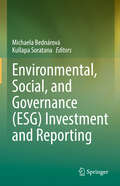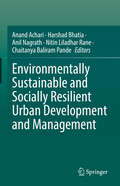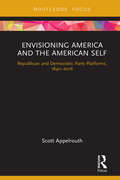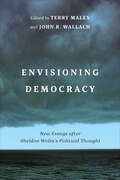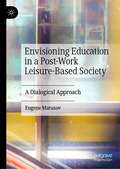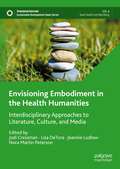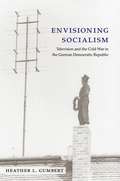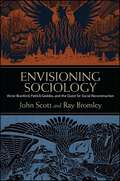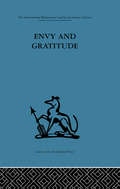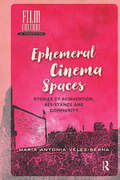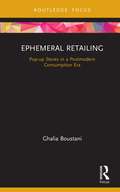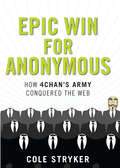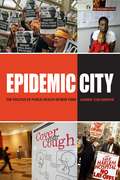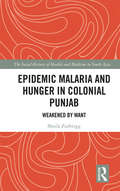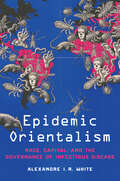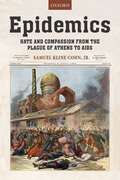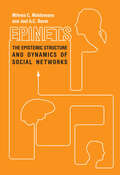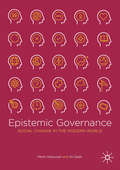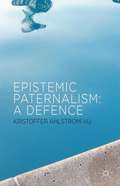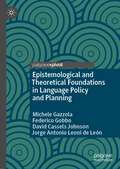- Table View
- List View
Environmental and Natural Resources Economics
by Fan Zhang Xiangzheng Deng Zhihui Li Malin Song Yuexian LiuThis book aims to integrate multiple disciplinary such as management, economics, and geography from the perspective of resource science and also to strengthen research on resource management to promote sustainability in natural resources. It established clear definition of natural resources and in-depth exploration of main fields such as water resources, land resources, and agricultural resources. Classic methods of economics are applied to solve the problems of resource consumption, environmental pollution, and climate change in modern society. On the basis of classical economics, the disciplinary system of environmental and natural resources is further developed. It is a helpful reference for readers to further study natural resources and environmental economics.
Environmental, Social, and Governance (ESG) Investment and Reporting
by Kullapa Soratana Michaela BednárováThis volume provides comprehensive coverage of ESG (Environmental, Social, and Governance) principles, offering an exhaustive examination of foundational concepts, specific factors, and their integration into investment analysis, ensuring a holistic understanding of the subject. It places a strong emphasis on the ethics of investing, exploring the importance of aligning investments with personal and societal values, which enriches the reader's ethical perspective. Practical insights are provided through real-world examples and case studies, making the content more relatable and actionable. The textbook also introduces cutting-edge concepts such as Corporate Digital Responsibility and ESGD reporting, preparing readers for future developments in ESG practices and keeping them ahead of industry trends. Detailed examinations of various global ESG reporting frameworks and standards, like GRI, IR, SASB, IISB, and ESRS, equip readers with the knowledge to choose the most appropriate methods for their needs. Emphasizing the seamless integration of ESG factors into traditional investment analysis, the book enhances readers' analytical skills and demonstrates how ESG considerations can be incorporated into all aspects of investment decision-making. Additionally, by addressing contemporary issues like greenwashing and bluewashing, it makes readers aware of the ethical challenges in ESG reporting and communication, equipping them to navigate these complexities effectively. Key takeaways include an in-depth understanding of ESG principles and their impact on investment decisions, insights into ethically integrating ESG considerations into investment strategies, and practical application skills through case studies. The forward-looking content ensures readers are prepared for future trends in ESG reporting and investing, including the impact of new technologies. Familiarity with various global standards allows readers to select suitable methodologies for their contexts. The focus on holistic integration of ESG factors improves analytical capabilities, making readers adept at identifying ESG risks and opportunities. This ESG investment and reporting book is intended for a diverse audience spanning academia, professionals, and classrooms alike. Academically, it serves as a comprehensive resource for students studying finance, business management, sustainability, or related fields, offering in-depth insights into the integration of Environmental, Social, and Governance (ESG) factors into investment strategies and reporting practices. Professionals in finance, investment management, corporate governance, sustainability consulting, and ESG reporting will find it invaluable for enhancing their understanding and practical application of ESG principles in their respective industries. Additionally, educators can leverage this book as a teaching tool in university courses focusing on sustainable finance, corporate governance, or ESG investing, providing students with practical knowledge and real-world examples to enrich their learning experience.
Environmentalism and Cultural Theory: Exploring the Role of Anthropology in Environmental Discourse (Environment and Society)
by Kay MiltonThe last decade has seen a dramatic increase in the attention paid by social scientists to environmental issues, and a gradual acknowledgement, in the wider community, of the role of social science in the public debate on sustainability. At the same time, the concept of `culture', once the property of anthropologists has gained wide currency among social scientist. These trends have taken place against a growing perception, among specialist and public, of the global nature of contemporary issues. This book shows how an understanding of culture can throw light on the way environmental issues are perceived and interpreted, both by local communities and within the contemporary global arena.Taking an anthropological approach the book examines the relationship between human culture and human ecology, and considers how a cultural approach to the study of environmental issues differs from other established approaches in social science. This book adds significantly to our understanding of environmentalism as a contemporary phenomenon, by demonstrating the distinctive contribution of social and cultural anthropology to the environmental debate. It will be of particular interest to students and researchers in the fields of social science and the environment.
Environmentally Sustainable and Socially Resilient Urban Development and Management
by Chaitanya Baliram Pande Nitin Liladhar Rane Anand Achari Harshad Bhatia Anil NagrathThis book is an extensive guide that covers topics related to building sustainable and resilient urban environments. The book delves into crucial issues such as energy efficiency, air quality, climate change mitigation and adaptation, solid waste management, transportation, water balance, and flood control. This book is mainly intended for urban planners, policymakers, environmental managers, and researchers who are involved in urban development and management. It provides a thorough analysis of the current state of urban development and its impact on the environment and society. Furthermore, the book offers practical solutions and tools for improving sustainability and resilience. The topics addressed in this book are of utmost importance due to the increasing concerns about the impact of urbanization on the environment and society. The book highlights the challenges of rapid urbanization, such as air pollution, energy consumption, waste management, and water scarcity. It offers insights into sustainable and resilient urban development and management practices to tackle these challenges. The primary aim of this book is to provide a comprehensive overview of the latest tools and techniques for sustainable and resilient urban development and management. It provides practical solutions and case studies to demonstrate how these tools can be utilized to improve sustainability and resilience in urban environments. Additionally, the book seeks to increase awareness among urban planners, policymakers, and managers about the significance of sustainable and resilient urban development and the potential benefits of implementing these practices.
Envisioning America and the American Self: Republican and Democratic Party Platforms, 1840-2016
by Scott AppelrouthThis book explores the Democratic and Republican Party platforms from 1840 to 2016. As the only official, institutionally sanctioned document espousing the parties’ views on the state of the nation, the platforms present to the party faithful a diagnosis of what ails the country and the promise of possessing the necessary cure. In doing so, they offer more than a listing of specific issues in need of redress through legislative action, and moreover serve as a form of national storytelling through which political parties forge their vision of America and of what it means to be an American. Using topic modeling as an entry point into the documents, the author moves to consider more closely two related themes: those of how the platforms narrate the "American" self and individual freedom. With consideration of the extent to which the parties envision the self as an isolated economic actor or as an individual with a range of duties and obligations to a broader community, the spheres of action that they consider focal points for individual autonomy, and the extent to which they view liberty as freedom from restraint or freedom to act, this book sheds light on the historical trajectory of the growing fracture in American politics as well as the points of convergence across the two parties. Moreover, positing that behind their divisive rhetoric, both share a fundamental vision of what it means to be a "person," the author argues that perhaps their seemingly intractable differences are more a matter of degree than kind.
Envisioning Democracy: New Essays after Sheldon Wolin’s Political Thought
by Terry Maley John R. WallachFew terms elicit such strong and varied feelings and yet have so little clarity as "democracy." Leaders of large states use "democracy" to designate their nations’ public character even as critics and rivals use the term to validate their own political perspectives. In Envisioning Democracy, the editors and contributors address the following questions: What does democracy mean today? What could it mean tomorrow? What is the dynamic of democracy in an increasingly interdependent world? Envisioning Democracy explores these questions amid the dynamic of democracy as a political phenomenon interacting with forms of economic, ethical, ethnic, and intellectual life. The book draws on the work of Sheldon S. Wolin (1922–2015), one of the most influential American theorists of the last fifty years. Here, scholars consider the historical conditions, theoretical elements, and practical impediments to democracy, using Wolin’s insights as touchstones in thinking through the possibilities and obstacles facing democracy now and in the future.
Envisioning Education in a Post-Work Leisure-Based Society: A Dialogical Approach
by Eugene MatusovThis book is both an analytic and imaginative study of the future role of education in a leisure-based society. Grounded in a philosophical approach that draws on the work of Aristotle, Arendt, Keynes, and others, the volume deconstructs modern work-based society, as well as mainstream institutionalized education, which the author argues have systemically alienated students from their education, authorial agency, and society itself. The author argues for the value of intrinsic education, where the goals are based on students' own needs and interests, imagining new opportunities that can arise from the emergence of such a society.
Envisioning Embodiment in the Health Humanities: Interdisciplinary Approaches to Literature, Culture, and Media (Sustainable Development Goals Series)
by Nora Martin Peterson Jodi Cressman Lisa DeTora Jeannie LudlowEnvisioning Embodiment in the Health Humanities: Literature, Culture, and Media examines discourses of embodiment across disability studies, gender studies, cultural studies, and visual studies to inform educational practice as well as cultural criticism related to the health and medical humanities. The book argues that imagery and other visual elements in literature, comics, lived experience and the arts demonstrate the hybridity of the embodied experience and identity and have something to offer to clinical practice. Connected to the UN Sustainable Development Goals 3 (Health), 4 (Gender equality), and 16 (Strong institutions), the topics addressed in the essays include mental health, grief, COVID-19, healthcare practices, cancer, and women’s health. The volume is designed to be accessible to advanced undergraduate students as well as graduate students and to be useful for medical practitioners and others who are interested in the health humanities, disability studies, gender studies, or cultural studies.
Envisioning Power: Ideologies of Dominance and Crisis
by Eric R. WolfWith the originality and energy that have marked his earlier works, Eric Wolf now explores the historical relationship of ideas, power, and culture. Responding to anthropology's long reliance on a concept of culture that takes little account of power, Wolf argues that power is crucial in shaping the circumstances of cultural production. Responding to social-science notions of ideology that incorporate power but disregard the ways ideas respond to cultural promptings, he demonstrates how power and ideas connect through the medium of culture. Wolf advances his argument by examining three very different societies, each remarkable for its flamboyant ideological expressions: the Kwakiutl Indians of the Northwest Pacific Coast, the Aztecs of pre-Hispanic Mexico, and National Socialist Germany. Tracing the history of each case, he shows how these societies faced tensions posed by ecological, social, political, or psychological crises, prompting ideological responses that drew on distinctive, historically rooted cultural understandings. In each case study, Wolf analyzes how the regnant ideology intertwines with power around the pivotal relationships that govern social labor. Anyone interested in the history of anthropology or in how the social sciences make comparisons will want to join Wolf in Envisioning Power.
Envisioning Socialism: Television And The Cold War In The German Democratic Republic
by Heather GumbertEnvisioning Socialism examines television and the power it exercised to define the East Germans’ view of socialism during the first decades of the German Democratic Republic. In the first book in English to examine this topic, Heather L. Gumbert traces how television became a medium prized for its communicative and entertainment value. She explores the difficulties GDR authorities had defining and executing a clear vision of the society they hoped to establish, and she explains how television helped to stabilize GDR society in a way that ultimately worked against the utopian vision the authorities thought they were cultivating. Gumbert challenges those who would dismiss East German television as a tool of repression that couldn’t compete with the West or capture the imagination of East Germans. Instead, she shows how, by the early 1960s, television was a model of the kind of socialist realist art that could appeal to authorities and audiences. Ultimately, this socialist vision was overcome by the challenges that the international market in media products and technologies posed to nation-building in the postwar period. A history of ideas and perceptions examining both real and mediated historical conditions, Envisioning Socialism considers television as a technology, an institution, and a medium of social relations and cultural knowledge. The book will be welcomed in undergraduate and graduate courses in German and media history, the history of postwar Socialism, and the history of science and technologies.
Envisioning Sociology: Victor Branford, Patrick Geddes, and the Quest for Social Reconstruction (SUNY Press Open Access)
by John Scott Ray BromleyEnvisioning Sociology is a landmark work, the first major study of the founding of sociology in Britain and the enormous contributions made by the intellectual circle led by Victor Branford and Patrick Geddes. Authors John Scott and Ray Bromley chronicle the biographical connections and personal partnerships of the circle's key participants, their international connections, their organization-building work, and the business activities that underpinned their efforts. Branford and Geddes fashioned an ambitious and wide-ranging interdisciplinary vision, drawing on geography, anthropology, economics, and urban planning, in addition to sociology. This vision was an integral part of a project of social reconstruction, a "third way" eschewing both liberalism and communism in favor of cooperation, redistribution, and federalism. Envisioning Sociology uncovers a previously hidden history of the social sciences, giving readers a fascinating glimpse into early twentieth-century social science and political economy, while demonstrating the contemporary relevance of the ideas of these underrated figures. Although Branford and Geddes failed to establish the grand sociology they envisioned, their ideas helped develop the theory and practice of community development, participatory democracy, bioregionalism, historic preservation, and neighborhood upgrading.SUNY Press has collaborated with Knowledge Unlatched to unlock KU Select titles. The Knowledge Unlatched titles have been made open access through libraries coming together to crowd fund the publication cost. Each monograph has been released as open access making the eBook freely available to readers worldwide. Discover more about the Knowledge Unlatched program here: https://www.knowledgeunlatched.org/, and access the book online at the SUNY Open Access Repository at <a href="http://hdl.handle.net/20.500.12648/8479 ">http://hdl.handle.net/20.500.12648/8479 .
Envy Up, Scorn Down: How Status Divides Us
by Susan T. FiskeAn insightful examination of why we compare ourselves to those above and below us. The United States was founded on the principle of equal opportunity for all, and this ethos continues to inform the nation’s collective identity. In reality, however, absolute equality is elusive. The gap between rich and poor has widened in recent decades, and the United States has the highest level of economic inequality of any developed country. Social class and other differences in status reverberate throughout American life, and prejudice based on another’s perceived status persists among individuals and groups. In Envy Up, Scorn Down, noted social psychologist Susan Fiske examines the psychological underpinnings of interpersonal and intergroup comparisons, exploring why we compare ourselves to those both above and below us and analyzing the social consequences of such comparisons in day-to-day life. What motivates individuals, groups, and cultures to envy the status of some and scorn the status of others? Who experiences envy and scorn most? Envy Up, Scorn Down marshals a wealth of recent psychological studies as well as findings based on years of Fiske’s own research to address such questions. She shows that both envy and scorn have distinctive biological, emotional, cognitive, and behavioral characteristics. And though we are all “wired” for comparison, some individuals are more vulnerable to these motives than others. Dominant personalities, for example, express envy toward high-status groups such as the wealthy and well-educated, and insecurity can lead others to scorn those perceived to have lower status, such as women, minorities, or the disabled. Fiske shows that one’s race or ethnicity, gender, and education all correlate with perceived status. Regardless of whether one is accorded higher or lower status, however, all groups rank their members, and all societies rank the various groups within them. We rate each group as either friend or foe, able or unable, and accordingly assign them the traits of warmth or competence. The majority of groups in the United States are ranked either warm or competent but not both, with extreme exceptions: the homeless or the very poor are considered neither warm nor competent. Societies across the globe view older people as warm but incompetent. Conversely, the very rich are generally considered cold but highly competent. Envy Up, Scorn Down explores the nuances of status hierarchies and their consequences and shows that such prejudice in its most virulent form dehumanizes and can lead to devastating outcomes—from the scornful neglect of the homeless to the envious anger historically directed at Tutsis in Rwanda or Jews in Europe. Individuals, groups, and even cultures will always make comparisons between and among themselves. Envy Up, Scorn Down is an accessible and insightful examination of drives we all share and the prejudice that can accompany comparison. The book deftly shows that understanding envy and scorn—and seeking to mitigate their effects—can prove invaluable to our lives, our relationships, and our society.
Envy and Gratitude: A study of unconscious sources
by Melanie KleinTavistock Press was established as a co-operative venture between the Tavistock Institute and Routledge & Kegan Paul (RKP) in the 1950s to produce a series of major contributions across the social sciences. This volume is part of a 2001 reissue of a selection of those important works which have since gone out of print, or are difficult to locate. Published by Routledge, 112 volumes in total are being brought together under the name The International Behavioural and Social Sciences Library: Classics from the Tavistock Press. Reproduced here in facsimile, this volume was originally published in 1957 and is available individually. The collection is also available in a number of themed mini-sets of between 5 and 13 volumes, or as a complete collection.
Ephemeral Cinema Spaces: Stories of Reinvention, Resistance and Community (Film Culture in Transition)
by Maria Vélez-SernaWith changing technologies and social habits, the communal cinema experience would seem to be a legacy from another era. However, the 2010s saw a surge in interest for screening films in other temporary public settings. This desire to turn ruins, pubs, galleries, parks, village halls, and even boats into ephemeral cinema spaces is a search for ways of being and working together, using cinema as a framework for social encounter. This book documents contemporary practices of pop-up and sitespecific cinema exhibition in the UK (with a focus on Scotland), tracing their links with historical forms of non-theatrical exhibition such as public hall cinema and fairground bioscopes. Through archival research, observation and interviews with film exhibitors and programmers, the book explores how exhibitors create ephemeral social spaces, how they negotiate the various uses and configurations of films and venues, and how they reinvent cinemagoing from its margins.
Ephemeral Retailing: Pop-up Stores in a Postmodern Consumption Era (Routledge Focus on Business and Management)
by Ghalia BoustaniOften described as the "hottest" retail phenomenon, ephemeral retail concerns the growth of pop-up stores as a new mode of retailing. These temporary stores "pop-up" without notice, quickly attract crowds, then disappear or morph into something else. Although they share similarities with traditional physical stores and online stores, ephemeral stores outshine existing retail formats as they have many unique and differentiating characteristics. These stores are becoming more popular among distribution channels as they offer exclusive and surprising retail experiences. Many established brands have already integrated these new points of sale into their distribution channels, while other brands are adopting them to raise communication, awareness, sales or just for experimentation. This phenomenon is finding its place amongst retailers not only for its efficiency and effectiveness but also for its unique impact, providing a sense of novelty that makes it particularly attractive to postmodern consumers seeking hedonic experiences. This concise text introduces all aspects of this growing phenomenon and contextualises it within existing channels of distribution. It explores brand atmospheric interventions that are designed to affect customer emotions, behaviours or experiences, as well as practices retailers adopt to build relationships with their customers. It will be of interest to scholars and advanced students in retail marketing and branding.
Epic Win for Anonymous: How 4chan's Army Conquered the Web
by Cole StrykerA “sharp, witty, and well-researched” history of 4chan and its cultural impact (The Rumpus).Created by a fifteen-year-old wunderkind in 2003, it is the creative force behind “the Web's most infectious memes and catchphrases” (Wired). Today it has millions of monthly users, and enormous social influence. Epic Win for Anonymous is the first book to tell 4chan’s story. Longtime blogger and 4chan expert Cole Stryker writes with a voice that is engrossingly informative and approachable. Whether examining the 4chan-provoked Jessi Slaughter saga and how cyber-bullying is part of our new reality, or explaining how Sarah Palin’s email account was leaked, Epic Win for Anonymous proves 4chan’s transformative cultural impact, and how it has influenced—and will continue to influence—society at large.
Epidemic City: The Politics of Public Health in New York
by James ColgroveAn insightful chronicle of the changing public health demands in New York City. The first permanent Board of Health in the United States was created in response to a cholera outbreak in New York City in 1866. By the mid-twentieth century, thanks to landmark achievements in vaccinations, medical data collection, and community health, the NYC Department of Health had become the nation’s gold standard for public health. However, as the city’s population grew in number and diversity, the department struggled to balance its efforts between the treatment of diseases—such as AIDS, tuberculosis, and West Nile Virus—and the prevention of illness-causing factors like lead paint, heroin addiction, homelessness, smoking, and unhealthy foods. In Epidemic City, historian of public health James Colgrove chronicles the challenges faced by the health department since New York City’s mid-twentieth-century “peak” in public health provision. This insightful volume draws on archival research and oral histories to examine how the provision of public health has adapted to the competing demands of diverse public needs, public perceptions, and political pressure. Epidemic City analyzes the perspectives and efforts of the people responsible for the city’s public health from the 1960s to the present—a time that brought new challenges, such as budget and staffing shortages, and new threats like bioterrorism. Faced with controversies such as needle exchange programs and AIDS reporting, the health department struggled to maintain a delicate balance between its primary focus on illness prevention and the need to ensure public and political support for its activities. In the past decade, after the 9/11 attacks and bioterrorism scares partially diverted public health efforts from illness prevention to threat response, Mayor Michael Bloomberg and Health Commissioner Thomas Frieden were still able to pass New York’s Clean Indoor Air Act restricting smoking and significant regulations on trans-fats used by restaurants. This legislation—preventative in nature much like the department’s original sanitary code—reflects a return to the nineteenth century roots of public health, when public health measures were often overtly paternalistic. The assertive laws conceived by Frieden and executed by Bloomberg demonstrate how far the mandate of public health can extend when backed by committed government officials. Epidemic City provides a compelling historical analysis of the individuals and groups tasked with negotiating the fine line between public health and political considerations. By examining the department’s successes and failures during the ambitious social programs of the 1960s, the fiscal crisis of the 1970s, the struggles with poverty and homelessness in the 1980s and 1990s, and in the post-9/11 era, Epidemic City shows how the NYC Department of Health has defined the role and scope of public health services for the entire nation.
Epidemic Malaria and Hunger in Colonial Punjab: Weakened by Want (The Social History of Health and Medicine in South Asia)
by Sheila ZurbriggThis book documents the primary role of acute hunger (semi- and frank starvation) in the ‘fulminant’ malaria epidemics that repeatedly afflicted the northwest plains of British India through the first half of colonial rule. Using Punjab vital registration data and regression analysis it also tracks the marked decline in annual malaria mortality after 1908 with the control of famine, despite continuing post-monsoonal malaria transmission across the province. The study establishes a time-series of annual malaria mortality estimates for each of the 23 plains districts of colonial Punjab province between 1868 and 1947 and for the early post-Independence years (1948-60) in (East) Punjab State. It goes on to investigate the political imperatives motivating malaria policy shifts on the part of the British Raj. This work reclaims the role of hunger in Punjab malaria mortality history and, in turn, raises larger epistemic questions regarding the adequacy of modern concepts of nutrition and epidemic causation in historical and demographic analysis. Part of The Social History of Health and Medicine in South Asia series, this book will be useful to scholars and researchers of colonial history, modern history, social medicine, social anthropology and public health.
Epidemic Orientalism: Race, Capital, and the Governance of Infectious Disease
by Alexandre I. WhiteFor many residents of Western nations, COVID-19 was the first time they experienced the effects of an uncontrolled epidemic. This is in part due to a series of little-known regulations that have aimed to protect the global north from epidemic threats for the last two centuries, starting with International Sanitary Conferences in 1851 and culminating in the present with the International Health Regulations, which organize epidemic responses through the World Health Organization. Unlike other equity-focused global health initiatives, their mission—to establish "the maximum protections from infectious disease with the minimum effect on trade and traffic"—has remained the same since their founding. Using this as his starting point, Alexandre White reveals the Western capitalist interests, racism and xenophobia, and political power plays underpinning the regulatory efforts that came out of the project to manage the international spread of infectious disease. He examines how these regulations are formatted; how their framers conceive of epidemic spread; and the types of bodies and spaces it is suggested that these regulations map onto. Proposing a modified reinterpretation of Edward Said's concept of orientalism, White invites us to consider "epidemic orientalism" as a framework within which to explore the imperial and colonial roots of modern epidemic disease control.
Epidemics: Hate and Compassion from the Plague of Athens to AIDS
by Samuel K. CohnBy investigating thousands of descriptions of epidemics reaching back before the fifth-century-BCE Plague of Athens to the distrust and violence that erupted with Ebola in 2014, Epidemics challenges a dominant hypothesis in the study of epidemics, that invariably across time and space, epidemics provoked hatred, blaming of the 'other', and victimizing bearers of epidemic diseases, particularly when diseases were mysterious, without known cures or preventive measures, as with AIDS during the last two decades of the twentieth century. <p><p> However, scholars and public intellectuals, especially post-AIDS, have missed a fundamental aspect of the history of epidemics. Instead of sparking hatred and blame, this study traces epidemics' socio-psychological consequences across time and discovers a radically different picture: that epidemic diseases have more often unified societies across class, race, ethnicity, and religion, spurring self-sacrifice and compassion.
Epidemiologic Research on Real-World Medical Data in Japan: Volume 1 (SpringerBriefs for Data Scientists and Innovators #1)
by Naoki NakashimaThis book analyzes the development of medical big data projects in Japan.Japan is experiencing unprecedented population aging, and labor productivity has decreased accordingly. Big data analysis of the Japanese medical real-world database (RWD) has the potential to tackle this issue.To allow readers to gain an understanding of Japanese medical big data analysis, the book discusses the original Japanese system that generates medical RWDs in the hospital medical records system, the nationwide standardized health checkup system, and the public medical insurance system in Japan.After introducing four major big data projects in the healthcare–medical field in Japan, the book explains the importance of creating information standards to maintain data quality and to analyze medical big data. It enables readers to analyze which standards are installed in which RWDs, how the standards are maintained, and which issues are prevalent in Japan.This book also describes the ethical processes involved in big data projects involving medical RWDs in Japan.
Epinets: The Epistemic Structure and Dynamics of Social Networks
by Mihnea C. Moldoveanu Joel A.C. BaumEpinets presents a new way to think about social networks, which focuses on the knowledge that underlies our social interactions. Guiding readers through the web of beliefs that networked individuals have about each other and probing into what others think, this book illuminates the deeper character and influence of relationships among social network participants. Drawing on artificial intelligence, the philosophy of language, and epistemic game theory, Moldoveanu and Baum formulate a lexicon and array of conceptual tools that enable readers to explain, predict, and shape the fabric and behavior of social networks. With an innovative and strategically-minded look at the assumptions that enable and clog our networks, this book lays the groundwork for a leap forward in our understanding of human relations.
Epistemic Governance: Social Change in the Modern World
by Pertti Alasuutari Ali QadirThis book argues that modern governance is performed by actors who seek social change epistemically, by drawing on widespread, public views of reality. Agents of change such as parliamentarians or social movement activists will assess and affect what they believe to be people’s conceptions of what is possible, rational, and desirable. This often means that these key authority figures will invest in credible knowledge production, as well as appeal to individual and group identifications, emotions, and values.Alasuutari and Qadir show how this epistemic governance works in three important arenas of social change: parliaments, which debate laws that constitute the bulk of reforms; international organizations that circulate global norms; and social movements and NGOs. Through their analysis, the authors’ detailed, innovative methodology for discourse analysis indicates the utility of epistemic governance as a new paradigm for research into global social change. This book will be of use to students in upper level degree programs who want to design empirical research into social change as well as researchers in sociology, political science and public policy.
Epistemic Paternalism
by Kristoffer Ahlstrom-VijAny attempt to help us reason in more accurate ways faces a problem: While we acknowledge that others stand to benefit from intellectual advice, each and every one of us tends to consider ourselves an exception, on account of overconfidence. The solution? Accept a form of epistemic paternalism.
Epistemological and Theoretical Foundations in Language Policy and Planning
by Michele Gazzola David Cassels Johnson Federico Gobbo Jorge Antonio Leoni de LeónThis book advances the growing area of language policy and planning (LPP) by examining the epistemological and theoretical foundations that engendered and sustain the field, drawing on insights and approaches from anthropology, linguistics, economics, political science, and education to create an accessible and inter-disciplinary overview of LPP as a coherent discipline. Throughout the book, the authors address LPP from different perspectives, exploring the interface between planning in theory and its practical problems in implementation. This volume will be of interest to students and scholars with an interest in LPP in particular, and educational, social, and public policy more broadly.

